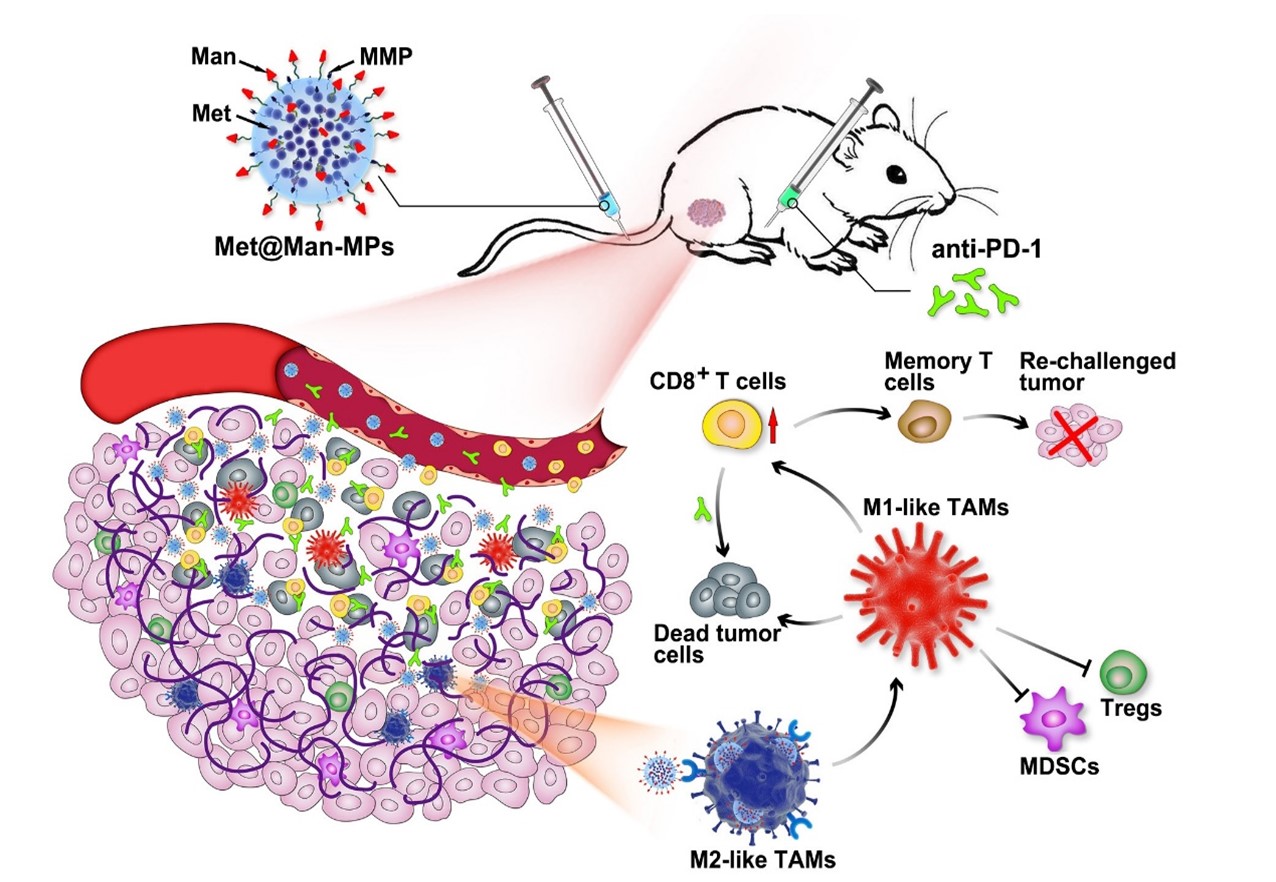On January 19, 2021, a research paper entitled “Boosting Anti-PD-1 Therapy with Metformin-Loaded Macrophage-Derived Microparticles” has been published online in Nature Communications. This paper is completed by the team of Professor Xiangliang Yang and Professor Lu Gan from National Engineering Research Center for Nanomedicine, College of Life Science and Technology, Huazhong University of Science and Technology (HUST).
Programmed cell death 1(PD-1)/PD-1 ligand (PD-L1) checkpoint blockade is a promising clinical anticancer treatment modality. However, durable response rate to anti-PD-1 therapy remains relatively low in most cases. The major factors attributed to the resistance to anti-PD-1 therapy include the lack of infiltrating T lymphocytes in tumor tissues characterizing the so-called “cold-tumor”, and the presence of tumor immunosuppressive microenvironment, such as M2-like tumor associated macrophages (TAMs), myeloid-derived suppressor cells (MDSCs) and regulatory T (Treg) cells to inhibit anti-PD-1 antibody-regenerated anti-tumor cytotoxic T lymphocytes and Th1 cell response. In addition, the aberrant vascular architecture, elevated interstitial fluid pressure and compact extracellular matrix (ECM) in tumor tissues hamper the tumor accumulation of anti-PD-1 antibody and subsequent deep penetration into tumor parenchyma, which limits the therapeutic effects of anti-PD-1 antibody. Therefore, enhancing the potential responses to anti-PD-1/PD-L1 antibody remains a big challenge.
M2-like TAMs play an essential role in promoting tumor growth, angiogenesis, metastasis, and tumor immune escape. In view of the tumor targeting capacity of macrophages and the highly expression of mannose receptor in M2-like TAMs, mannose (Man)-modified macrophage-derived microparticles (MPs) are used as carriers for targeted delivery of metformin (denoted as Met@Man-MPs) to M2-like TAMs. Met@Man-MPs efficiently reset TAMs toward M1 phenotype to inhibit tumor growth. Meanwhile, Met@Man-MPs significantly improve tumor immune microenvironment, as evidenced by the enhanced CD8+ T cell recruitment by the re-educated macrophage-secreted TNF-α and decreased MDSCs and Treg cells. More importantly, the collagen-degrading capacity of Met@Man-MPs with matrix metalloproteinase activity contributes to the infiltration of CD8+ T cells into tumor interiors and enhanced tumor accumulation and penetration of anti-PD-1 antibody. These unique features of Met@Man-MPs contribute to the anticancer treatment of anti-PD-1 antibody, leading to the strong anticancer efficacy and the generation of long-term memory immunity after co-administration. This study provides a new strategy for boosting the therapeutic effect of anti-PD-1 antibody.

Professors Lu Gan and Xiangliang Yang from College of Life Science and Technology, HUST and Professor Bo Huang from Institute of Basic Medical Sciences, Chinese Academy of Medical Sciences are the co-corresponding authors of this work. Ph. D students Zhaohan Wei and Xiaoqiong Zhang are the co-first authors of this work. Professor Bixiang Zhang and Dr. Jingjing Yu from Tongji Hospital, Tongji Medical College, HUST, and Doctor Gang Huang from School Hospital, HUST also participate in this work. This work is supported by National Key R&D Program of China and National Natural Science Foundation of China.
Link: https://www.nature.com/articles/s41467-020-20723-x